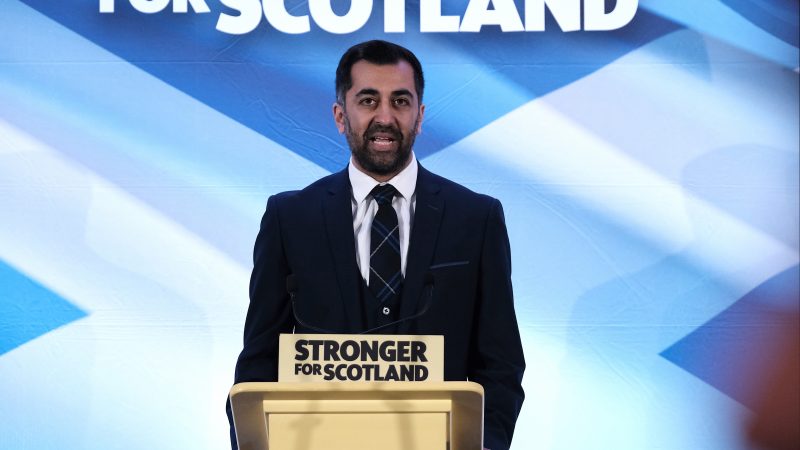
It was only last June that the SNP promised “there will be an independence referendum on Thursday 19th of October 2023” – this week. The suggestion that the Scottish government could organise a referendum, when they did not have the power to make it legally binding, seemed far-fetched at the time and desperate in hindsight.
As a man under pressure, SNP leader Humza Yousaf attempted to seize the initiative last weekend with another way forward. According to the new strategy, if the party wins at least 29 of the 57 Scottish seats – a majority – the SNP would claim this as a mandate for independence. Yet as with previous iterations of the ‘de-facto referendum’ plan, Yousaf is taking on considerable risk for little, if any, discernible reward.
Yousaf’s strategy is brave given SNP support is plunging
First, to state the obvious, the strategy is a brave one when support for the SNP is plunging. Plug the numbers from the most recent opinion poll into Electoral Calculus’ model and the SNP would return 19 seats at the next general election, haemorrhaging 29 from the last election and putting them well short of their target.
Then consider the fact that the SNP likely has further to fall before it reaches rock bottom. The party is so divided that one of its MPs defected to join the Conservatives, it faces an ongoing police investigation, its leader’s approval ratings are dire and Scottish Labour has a newfound confidence.
At the general election, the SNP will do its best to put the constitutional question front and centre but lacks the clout to frame the debate in the media when the election is UK-wide. This means Labour can refuse to play ball, easily sidestepping the independence question by saying “we are focused on the economy/NHS/cost of living”, given elections are fought on a myriad of issues.
But should the SNP fail to meet the threshold, then it has now lost twice – 2014 and 2023 – and future UK governments will happily remind them of that fact when batting away further demands for a referendum.
Yousaf has yet to develop a plan to win over a majority of Scots
However, let’s say the SNP scrapes by and hits the 29-seat target. Having lost 20 seats from the last general election, claiming that it now has a fresh mandate to negotiate independence isn’t particularly convincing.
Even in a wildly optimistic scenario, in which Yousaf ignites an unprecedented renaissance in support for a party that’s been in government for 15 years, then what if the next Prime Minister refuses to recognise it as a mandate? The party would be back to square one.
In his speech to the SNP conference last weekend, Yousaf recognised “there is no shortcut that will get us to independence” and that success would require listening, campaigning and persuading.
If he were serious about doing so, he’d drop plans to push the constitutional question again and do the more necessary work of developing a convincing plan that would win over a clear majority of Scots. Then, once Scottish voters become disillusioned with Labour should it form the next government, as inevitably happens in politics, the SNP would be better positioned to relaunch its campaign as it sweeps up the protest vote.
Stepping back from independence might start an SNP civil war
To be fair, I have not considered the counterfactual. What if Yousaf actually did climb down from the independence question for the time being? The party would, in all likelihood, break out into the open civil war that has been threatening to erupt for years.
Alex Salmond’s Alba Party would be waiting in the wings to lap up the newly disenchanted members, while an emboldened Kate Forbes would likely launch a leadership challenge. Putting aside Yousaf’s personal interest in remaining First Minister, such instability would surely further damage the SNP and the independence movement.
As with the second referendum that never was, the fact that there are no good options is entirely down to the party’s continued inability to level with its own membership that independence is not around the corner.
Common sense would tell you a high-stakes gamble from a position of weakness is ill-advised. But for a party running on fumes, a punt at a ‘de facto referendum’ may be all that they have left.




More from LabourList
Antonia Romeo appointed to lead civil service as new Cabinet Secretary
‘If Labour is serious about upskilling Britain, it must mobilise local businesses’
Stella Tsantekidou column: ‘What are we to make of the Labour Together scandal?’